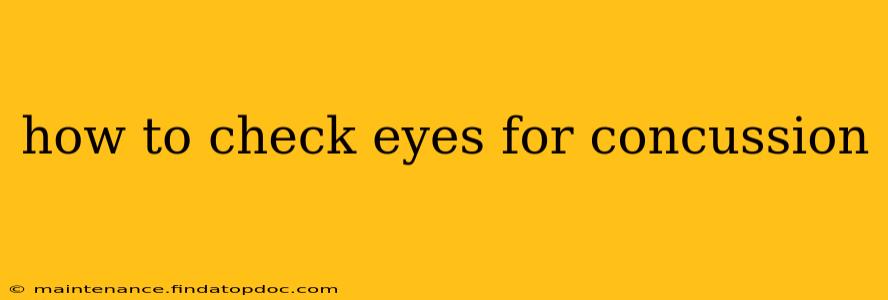A concussion, also known as a mild traumatic brain injury (mTBI), can cause a variety of symptoms, some of which are subtle and easily missed. One area often overlooked in concussion assessment is the eyes. Eye exams can provide valuable insights into the presence and severity of a concussion, supplementing other clinical assessments. This guide will explore how to check eyes for concussion, focusing on key signs and the importance of professional medical evaluation.
Important Disclaimer: This information is for educational purposes only and should not be considered medical advice. A proper concussion assessment requires a thorough examination by a qualified healthcare professional. Never attempt to diagnose or treat a concussion yourself. If you suspect a concussion, seek immediate medical attention.
What Eye Problems Can Indicate a Concussion?
Several eye-related issues can signal a possible concussion. These aren't always immediately apparent and may develop over time.
1. Pupillary Asymmetry (Unequal Pupil Size):
This is a significant indicator and often one of the first signs a medical professional will check. Unequal pupils, or anisocoria, can result from concussion-related damage to the oculomotor nerve, which controls pupil size and eye movement.
2. Impaired Eye Movement (Oculomotor Dysfunction):
Concussions can disrupt the coordinated movements of the eyes. This can manifest as difficulty following a moving object smoothly (dysmetria), double vision (diplopia), or nystagmus (involuntary eye movements). These impairments can affect reading, focusing, and overall visual processing.
3. Visual Field Defects:
Concussions can impact the visual fields, the areas you see when looking straight ahead. Individuals may experience partial vision loss in one or both eyes, a condition that can make navigation and daily tasks challenging.
4. Convergence Insufficiency:
This involves difficulty focusing both eyes on a near object simultaneously. It's a common problem following a concussion and can cause eye strain, headaches, and blurred vision, particularly when reading or using a computer.
5. Light Sensitivity (Photophobia):
Increased sensitivity to light is a common concussion symptom, potentially stemming from inflammation or irritation of the brain and optic nerves.
6. Blurred Vision:
Blurry vision can be a result of several concussion-related issues, such as optic nerve dysfunction, oculomotor problems, or overall brain swelling.
How Are Eye Examinations Conducted for Concussions?
Medical professionals use several methods to assess eye function after a suspected concussion:
- Pupil Examination: Checking the size and reactivity of pupils to light.
- Visual Acuity Test: Measuring the sharpness of vision.
- Eye Movement Tests: Assessing the smoothness and accuracy of eye movements in various directions.
- Visual Field Testing: Determining the extent of peripheral vision.
- Convergence Tests: Evaluating the ability to focus both eyes on near objects.
How Long Do Eye Problems Related to Concussion Last?
The duration of eye problems following a concussion varies greatly depending on the severity of the injury and individual factors. Some individuals experience quick resolution, while others may have persistent visual difficulties for weeks or even months. In rare cases, lasting vision problems can be a complication of a significant concussion.
What to Do if You Suspect a Concussion?
Seek immediate medical attention. A healthcare professional will perform a thorough examination, including a neurological assessment and potentially eye exams, to determine the extent of the injury and recommend appropriate management.
Can Eye Exercises Help with Concussion-Related Eye Problems?
While eye exercises might offer some benefit in managing specific visual symptoms, they should not replace professional medical care. A healthcare professional can determine if vision therapy is appropriate and guide you through the process.
Is it Possible to Have Eye Problems from a Concussion Without Other Symptoms?
Yes, it is possible. Some individuals may experience primarily eye-related symptoms following a concussion without other classic signs like headache or dizziness. This highlights the importance of a comprehensive assessment, including an eye examination, even in the absence of prominent symptoms.
This comprehensive guide provides an overview of eye-related concerns after a concussion. Remember that prompt medical evaluation is crucial for proper diagnosis and management of any concussion-related symptoms. Do not rely solely on this information; always consult with a qualified healthcare professional for accurate assessment and treatment.
